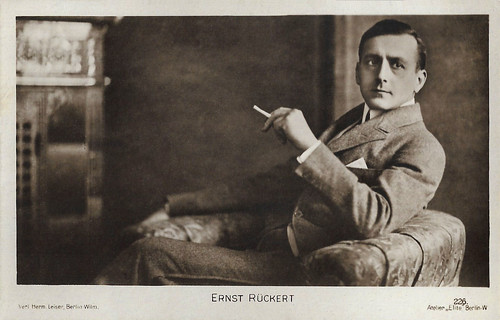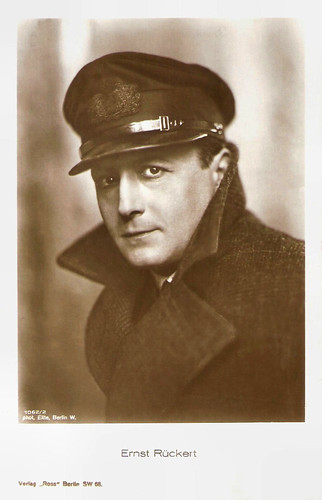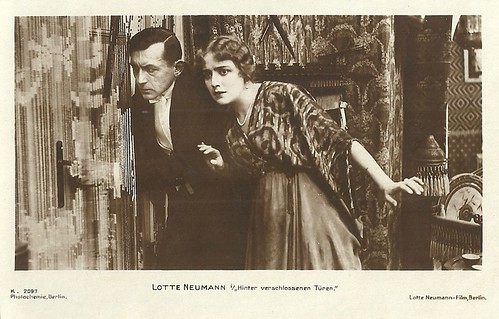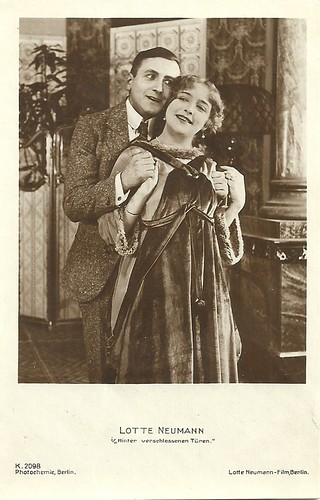Ernst Rückert (1886-1950) was a German stage and screen actor. In the 1910s he was a popular film actor, while in the mid-1920s he starred in so-called Prussian films.

German postcard by Verlag Hermann Leiser, Berlin-Wilm., no. 220. Photo: Atelier Elite, Berlin.

German postcard by Verl. Herm. Leiser, Berlin-Wilm., no. 226. Photo: Atelier 'Elite', Berlin.

Austrian postcard by Iris Verlag, no. 686. Photo: Naxos-Film / Verleih E. Weil & Co.

German postcard by Verlag Ross, Berlin, no. 1062/2, 1927-1928. Photo: Elite, Berlin W.

German postcard by Ross Verlag, Berlin, no. 4023/1, 1929-1930. Photo: Mac Walten, Berlin.
Ernst Rückert was born Anton Ernst Rücker (without -t) in Berlin, Germany, in 1886 (according to IMDb in 1892).
He began his theatre career in 1908 and appeared on stage in Bleicherode, Königsberg, and Kiel, among others. In 1910, he started an engagement at the Luisentheater in Berlin. From 1911, he was a sought-after silent film actor, initially in leading roles at the company Continental Kunstfilm.
In 1912 he played the first officer of the Titanic in the Continental production In Nacht und Eis/In Night and Ice, directed by Mime Misu. The film was produced by Continental-Kunstfilm of Berlin, and while most of its footage was shot in a glasshouse studio, some footage was shot in Hamburg, and some footage was possibly done aboard the German ocean liner SS Kaiserin Auguste Victoria, then docked at Hamburg. With a running time of 35 minutes, In Nacht und Eis was three times longer than the average film of 1912. Shot in black and white, various scenes were tinted to heighten their impact, such as night scenes in dark blue and a shot of a stoker feeding a burner in red.
From 1914 to 1917, he took part in the First World War. In 1917 he continued his film career and continued to receive leading roles and important supporting roles. In the late 1910s, he was at Deutsche Mutoskop & Biograph (DMB) the film partner of Lotte Neumann in such films as Hinter verschlossenen Türen/Behind Closed Doors (Paul von Woringen, 1917) and the two-part film Schweigen im Walde/The Silence in the Forest (Paul von Woringen, 1918).
When Neumann left the Deutsche Mutoskop und Biograph, he was the partner of Magda Madeleine in e.g. Die lachende Maske/The laughing mask (Willy Zeyn Sr., 1918).
In the early 1920s, Rückert alternated the various Berlin studios with that of Emelka and in particular Union-Film in Munich. At Union, Franz Seitz was Rückert's regular director, while Dary Holm often had the female lead. At Emelka, Rückert often acted opposite Fritz Greiner, in e.g. the rural drama Der Ochsenkrieg/The War of the Oxen (Franz Osten, 1920).
Rückert was reunited with Lotte Neumann, but while, she played Julia, he had to be satisfied with playing the father of Romeo (Gustav von Wangenheim) in Ernst Lubitsch's Shakespeare spoof Romeo und Julia im Schnee/Romeo and Juliet in the Snow (1920), set in a 19th-century Alpine village. Rückert was enormously productive acting in well 24 films in the year 1920 alone. These were supporting parts, either major ones as the antagonist of the male leads, or smaller parts.

German postcard by Photochemie, Berlin, K. 2097. Photo: Lotte Neumann-Film, Berlin. Lotte Neumann and Ernst Rückert in Hinter verschlossenen Türen/Behind Closed Doors (Paul von Woringen, 1917).

German postcard by Photochemie, Berlin, K. 2098. Photo: Lotte Neumann-Film, Berlin. Lotte Neumann and Ernst Rückert in Hinter verschlossenen Türen/Behind Closed Doors (Paul von Woringen, 1917).

German postcard. Ross Verlag, no. 638/2. Photo: Maxim Film. Publicity still for Romeo und Julia im Schnee/Romeo and Juliet in the Snow (Ernst Lubitsch, 1920), with Lotte Neumann (Julia Capulethofer) and Gustav von Wangenheim (Romeo Montekugerl). Behind them, their shocked parents.

German postcard by Verlag Ross, Berlin, no. 1062/3, 1927-1928. Photo: Elite, Berlin. Ernst Rückert as Theodor Körner in Was Steine erzählen/What the Stones Tell (Rolf Randolf, 1925).

German postcard. Ernst Rückert as Fritz von Wedel in Die elf Schill'schen Offiziere/The Eleven Schill Officers (Rudolf Meinert, 1926).
In the mid-1920s, Ernst Rückert had major parts in the so-called Prussian films, historical films about the resistance of the Germans during the Napoleonic wars. In 1925 Rückert starred as Theodor Körner in the period piece Was Steine erzählen/What the Stones Tell (Rolf Randolf, 1925).
In Die elf schill'schen Offiziere/The Eleven Schill Officers (Rudolf Meinert, 1926), Rückert played a major part as Fritz von Wedel, one of a group of Prussian officers who have resisted the Napoleonic army. Their Major, Von Schill is killed and the others are captured, including Udo (Werner Pittschau), in love with Fritz's sister Marie. Fritz takes Udo's place, so Udo can flee with Marie (Mary Nolan). When Udo hears of the death sentence against the officers he runs back but too late.
Rückert had once more the lead as Theodor Körner in another patriotic film with a Prussian theme, Lützows wilde verwegene Jagd/Lützow's Wild Hunt (Richard Oswald, 1927), with Arthur Wellin in the title role. The film deals with a combination of the amorous encounters with a stage actress (Mary Kid) and a modern Jeanne d'Arc (Wera Engels), and the fight of the Germans against Napoleon (Paul Bildt) and his army, and this all in the year 1813, in which Körner died himself.
Less serious was Rückert's part as the Prince in Franz Hofer's remake of his own film, Das rosa Pantoffelchen/The Pink Slippers (Franz Hofer, 1927), with Hanni Reinwald in the female lead.
In the 1930s, Rückert became a minor, often uncredited actor in films. He also rarely got engagements in theater, such as in 1933 at the open-air stage of the Märkisches Museum. Until 1935, he regularly worked in film, with the last bit part in Parkstrasse (Jürgen von Alten, 1939), starring Olga Tschechova. In 1940 he was drafted, in the season 1941/1942, he was an actor and director at the Berlin Tourneetheater Gastspieldirektion IX. Finally, he was assigned to the K.d.F. front theater.
Ernst Rückert survived the war and died in 1950. He was 63 or 57 (the sources differ). According to IMDb, he acted in over 150 films.

German postcard by Verlag Hermann Leiser, no. 910. Photo: Atelier Eberth, Berlin.

German postcard by Photochemie, Berlin, no. K. 3000. Photo: Mac Walten, Berlin.

German postcard by Photochemie, Berlin, no. K. 3001. Photo: Mac Walten, Berlin.

German postcard by Verlag Ross, Berlin, no. 1062/1, 1927-1928. Photo: Elite, Berlin W.

German postcard by Ross Verlag, no. 4023/2, 1929-1930. Photo: Atelier Mac Walten.
Sources: Filmportal.deFilmportal.de, Wikipedia (German), and IMDb.

German postcard by Verlag Hermann Leiser, Berlin-Wilm., no. 220. Photo: Atelier Elite, Berlin.

German postcard by Verl. Herm. Leiser, Berlin-Wilm., no. 226. Photo: Atelier 'Elite', Berlin.

Austrian postcard by Iris Verlag, no. 686. Photo: Naxos-Film / Verleih E. Weil & Co.

German postcard by Verlag Ross, Berlin, no. 1062/2, 1927-1928. Photo: Elite, Berlin W.

German postcard by Ross Verlag, Berlin, no. 4023/1, 1929-1930. Photo: Mac Walten, Berlin.
A sought-after silent film actor
Ernst Rückert was born Anton Ernst Rücker (without -t) in Berlin, Germany, in 1886 (according to IMDb in 1892).
He began his theatre career in 1908 and appeared on stage in Bleicherode, Königsberg, and Kiel, among others. In 1910, he started an engagement at the Luisentheater in Berlin. From 1911, he was a sought-after silent film actor, initially in leading roles at the company Continental Kunstfilm.
In 1912 he played the first officer of the Titanic in the Continental production In Nacht und Eis/In Night and Ice, directed by Mime Misu. The film was produced by Continental-Kunstfilm of Berlin, and while most of its footage was shot in a glasshouse studio, some footage was shot in Hamburg, and some footage was possibly done aboard the German ocean liner SS Kaiserin Auguste Victoria, then docked at Hamburg. With a running time of 35 minutes, In Nacht und Eis was three times longer than the average film of 1912. Shot in black and white, various scenes were tinted to heighten their impact, such as night scenes in dark blue and a shot of a stoker feeding a burner in red.
From 1914 to 1917, he took part in the First World War. In 1917 he continued his film career and continued to receive leading roles and important supporting roles. In the late 1910s, he was at Deutsche Mutoskop & Biograph (DMB) the film partner of Lotte Neumann in such films as Hinter verschlossenen Türen/Behind Closed Doors (Paul von Woringen, 1917) and the two-part film Schweigen im Walde/The Silence in the Forest (Paul von Woringen, 1918).
When Neumann left the Deutsche Mutoskop und Biograph, he was the partner of Magda Madeleine in e.g. Die lachende Maske/The laughing mask (Willy Zeyn Sr., 1918).
In the early 1920s, Rückert alternated the various Berlin studios with that of Emelka and in particular Union-Film in Munich. At Union, Franz Seitz was Rückert's regular director, while Dary Holm often had the female lead. At Emelka, Rückert often acted opposite Fritz Greiner, in e.g. the rural drama Der Ochsenkrieg/The War of the Oxen (Franz Osten, 1920).
Rückert was reunited with Lotte Neumann, but while, she played Julia, he had to be satisfied with playing the father of Romeo (Gustav von Wangenheim) in Ernst Lubitsch's Shakespeare spoof Romeo und Julia im Schnee/Romeo and Juliet in the Snow (1920), set in a 19th-century Alpine village. Rückert was enormously productive acting in well 24 films in the year 1920 alone. These were supporting parts, either major ones as the antagonist of the male leads, or smaller parts.

German postcard by Photochemie, Berlin, K. 2097. Photo: Lotte Neumann-Film, Berlin. Lotte Neumann and Ernst Rückert in Hinter verschlossenen Türen/Behind Closed Doors (Paul von Woringen, 1917).

German postcard by Photochemie, Berlin, K. 2098. Photo: Lotte Neumann-Film, Berlin. Lotte Neumann and Ernst Rückert in Hinter verschlossenen Türen/Behind Closed Doors (Paul von Woringen, 1917).

German postcard. Ross Verlag, no. 638/2. Photo: Maxim Film. Publicity still for Romeo und Julia im Schnee/Romeo and Juliet in the Snow (Ernst Lubitsch, 1920), with Lotte Neumann (Julia Capulethofer) and Gustav von Wangenheim (Romeo Montekugerl). Behind them, their shocked parents.

German postcard by Verlag Ross, Berlin, no. 1062/3, 1927-1928. Photo: Elite, Berlin. Ernst Rückert as Theodor Körner in Was Steine erzählen/What the Stones Tell (Rolf Randolf, 1925).

German postcard. Ernst Rückert as Fritz von Wedel in Die elf Schill'schen Offiziere/The Eleven Schill Officers (Rudolf Meinert, 1926).
Historical films about the German resistance during the Napoleonic wars
In the mid-1920s, Ernst Rückert had major parts in the so-called Prussian films, historical films about the resistance of the Germans during the Napoleonic wars. In 1925 Rückert starred as Theodor Körner in the period piece Was Steine erzählen/What the Stones Tell (Rolf Randolf, 1925).
In Die elf schill'schen Offiziere/The Eleven Schill Officers (Rudolf Meinert, 1926), Rückert played a major part as Fritz von Wedel, one of a group of Prussian officers who have resisted the Napoleonic army. Their Major, Von Schill is killed and the others are captured, including Udo (Werner Pittschau), in love with Fritz's sister Marie. Fritz takes Udo's place, so Udo can flee with Marie (Mary Nolan). When Udo hears of the death sentence against the officers he runs back but too late.
Rückert had once more the lead as Theodor Körner in another patriotic film with a Prussian theme, Lützows wilde verwegene Jagd/Lützow's Wild Hunt (Richard Oswald, 1927), with Arthur Wellin in the title role. The film deals with a combination of the amorous encounters with a stage actress (Mary Kid) and a modern Jeanne d'Arc (Wera Engels), and the fight of the Germans against Napoleon (Paul Bildt) and his army, and this all in the year 1813, in which Körner died himself.
Less serious was Rückert's part as the Prince in Franz Hofer's remake of his own film, Das rosa Pantoffelchen/The Pink Slippers (Franz Hofer, 1927), with Hanni Reinwald in the female lead.
In the 1930s, Rückert became a minor, often uncredited actor in films. He also rarely got engagements in theater, such as in 1933 at the open-air stage of the Märkisches Museum. Until 1935, he regularly worked in film, with the last bit part in Parkstrasse (Jürgen von Alten, 1939), starring Olga Tschechova. In 1940 he was drafted, in the season 1941/1942, he was an actor and director at the Berlin Tourneetheater Gastspieldirektion IX. Finally, he was assigned to the K.d.F. front theater.
Ernst Rückert survived the war and died in 1950. He was 63 or 57 (the sources differ). According to IMDb, he acted in over 150 films.

German postcard by Verlag Hermann Leiser, no. 910. Photo: Atelier Eberth, Berlin.

German postcard by Photochemie, Berlin, no. K. 3000. Photo: Mac Walten, Berlin.

German postcard by Photochemie, Berlin, no. K. 3001. Photo: Mac Walten, Berlin.

German postcard by Verlag Ross, Berlin, no. 1062/1, 1927-1928. Photo: Elite, Berlin W.

German postcard by Ross Verlag, no. 4023/2, 1929-1930. Photo: Atelier Mac Walten.
Sources: Filmportal.deFilmportal.de, Wikipedia (German), and IMDb.
No comments:
Post a Comment